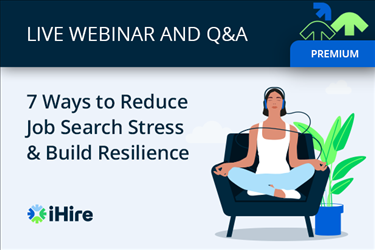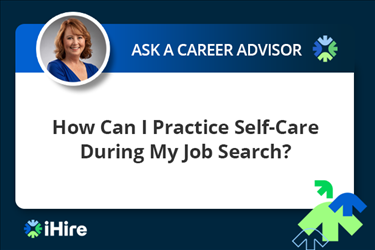- Job Seeker Resources
- |
- Last Updated: May 12, 2021

How to Find a Job During the Coronavirus Recession
The job market is rapidly changing amid the COVID-19 pandemic. An unprecedented number of workers are being laid off or furloughed, leaving millions of Americans without work. Whether you're freshly unemployed or have been searching for a job for months, you might be wondering if it's worthwhile to pursue new employment opportunities when so many businesses seem to be struggling to manage and maintain their existing workforce.
Though expert economists predict that a recession hangs on the horizon should conditions worsen, that shouldn’t discourage your job search. In fact, career advisors suggest that it’s more important now than ever to continue networking, applying, and fine-tuning your approach to set yourself up for success down the road. Realistically, those looking for work should be prepared for open positions to be put on hold or disappear altogether—however, in light of this reality, searchers should stay vigilant.
With all that said, don’t feel overwhelmed. Finding a job during the Coronavirus pandemic may take time and a healthy dose of patience, but it’s not impossible. Using this guide, we’ll give you the lowdown on how you can refine your search and application process to secure a job.
Familiarize yourself with online networking.
Due to statewide stay-at-home and national social-distancing orders, you can expect all networking events to be canceled for the foreseeable future. This means you’ll need to forge new pathways to stay on top of your networking strategy.
Look for professional groups to join on social media platforms that connect professionals. These platforms offer a wide range of niche groups for every profession, so regardless of whether you work in content marketing or hotel concierge, there is bound to be a group out there for you.
Inside of these networking communities, make a pointed effort to join in on the conversation, interact with others, and make yourself visible to increase your odds of fostering a meaningful connection with someone who could eventually land you a job.

Follow up and stay in touch.
In the event that you recently had a promising interview that left you feeling like a job offer was the next step, the best thing you can do is follow up and stay in touch. If the business hasn’t been entirely transparent with you about the fate of the position, try to be understanding, as the company is likely working through an influx of new conflicts. Ultimately, you want to strike the fine balance of keeping the opportunity on their radar without coming across as too pushy or adamant about receiving an answer.
So, what should you do? Follow up with the hiring manager by email that thoughtfully acknowledges that they may be scrambling to figure everything out and conveys your continued interest in the position. Rather than asking them to help you, ask if there’s anything you can do to lighten their load.
During a time like this, connecting with people on a human level speaks volumes. Your online networking should achieve the same result as in-person networking: showing how your skills and personability can be an asset to the company and exemplifying what type of employee you would be if you were hired.
Look outside of your comfort zone.
At the end of the day, tough times are all about survival, not choice. In order to successfully ensure you’re able to see the Coronavirus recession through, be prepared to step beyond the bounds of your comfort zone. This could mean anything from switching industries or expanding your geographical reach. If staying within your market, niche job, or city is not a viable avenue for employment, don’t be afraid to take the next steps to ensure you’re able to make ends meet.
Find your next great opportunity on iHire.
Expand your skillset.
If you’re under stay-at-home orders, there’s no better time to work on bolstering and adding to your qualifications. Upon examining job descriptions that interest you, be sure to check out the required skills or certifications employers value to set yourself up for hiring success. The more you’re able to bring to the table, the higher your odds of finding employment—even during these unusual times.
For example, if you’re applying for a social media marketing position, most jobs in that industry will likely require experience with Google Analytics and Hootsuite. Being certified in either of the two (or both) could make your resume stand out. Whatever it is that will give you a leg up, pursue it and perfect it to effectively make yourself an irresistible hire.

Practice your video interview.
Once you've heard back from an employer interested in your skillset, the next step is the interview. Due to social-distancing orders, the odds are likely that your interview will be a video-conference call. This can be a nerve-wracking experience (as is any job interview), and there are a number of extra considerations you’ll need to be aware of before it’s lights, camera, action. Keep the following three tips in mind as you practice for your video interviews:
1. Maintain good eye contact.
If you’ve ever talked on a webcam call, you understand how difficult it is to keep your eyes on the camera rather than on the other person or yourself. It’s natural for your eyes to wander to your interviewer’s face, but doing so will make it seem like you are looking down or away. To correct this, resize, remove, or move the interviewer’s screen as close to your webcam as possible.
2. Don’t forget to smile.
Too much smiling can be just that – too much. Think of your smile as a tool to demonstrate that you’re a pleasant person to be around and that you have a keen sense of social awareness. Use it strategically, sparingly, and meaningfully.
3. Assess and minimize your nervous energy.
Everyone has some form of nervous tic, twitch, or other distracting habits. In an interview, it's important to reel those habits in, as they can be incredibly distracting for everyone. To better assess tics you may not even know about, record yourself answering a few interview questions and watch your body language.
Finding a job during the Coronavirus recession may test your patience and perseverance, but with these tips in mind, you’ll be better prepared to jump into the job search with confidence.
About the Guest Author
Samantha Rupp holds a Bachelor of Science in Business Administration and is the managing editor for 365businesstips.com. She lives in San Diego, CA, and enjoys spending time on the beach, reading up on current industry trends, and traveling.
Sign In or Register to access all articles and insider tips for help in your job search.
Search for iHire Jobs
RELATED JOBS
RELATED RESOURCES
Find the Right Job Faster
- Get personalized job matches sent to your inbox every day
- Connect directly with employers before your competition
- Advance your career with expert advice on interviewing, salary negotiation, and more
We value your privacy




